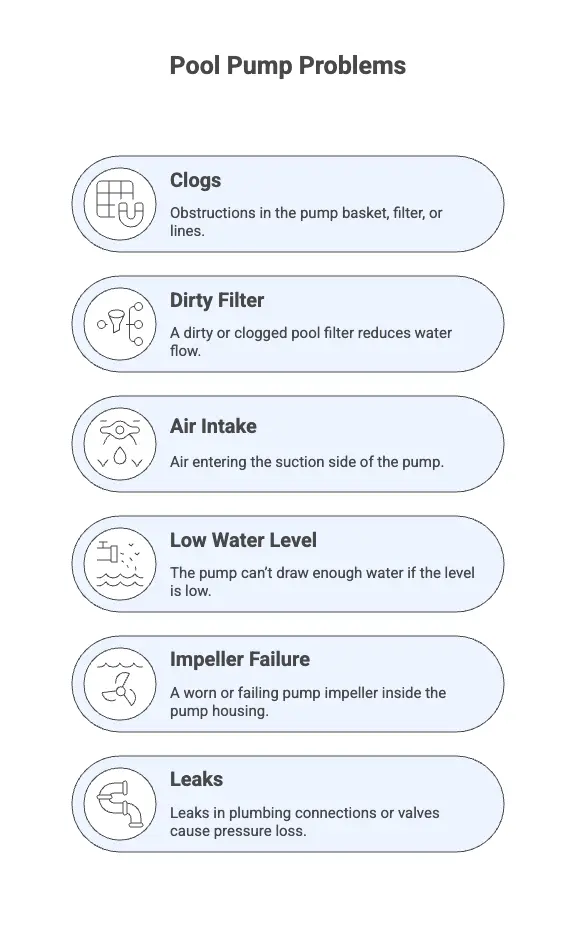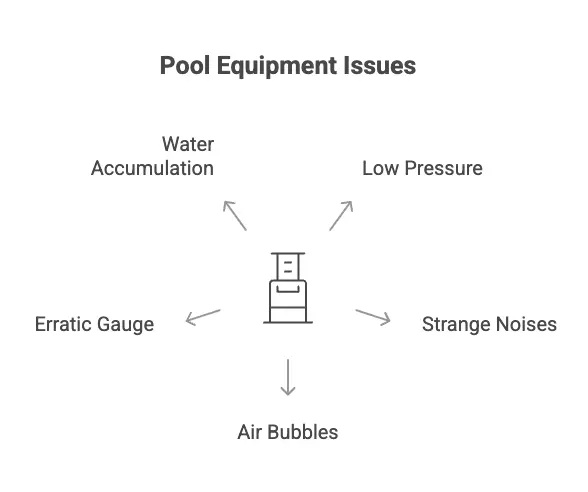July 30, 2025
Pool Pump Losing Pressure in Vancouver? Keep Your Pool System Powerfully Running
Summarize Blog with AI
Have you noticed your pool pump losing pressure, weak jets, or a sluggish filter? In Vancouver’s climate, a pool pump that doesn’t maintain water pressure can quickly turn pool enjoyment into pool frustration. Low pressure or flow in your pool system can signal minor issues or serious problems that demand fast attention. At BlackTie Pools, we blend local expertise with Leaktronics’ industry-leading leak detection to keep your pool clean, efficient, and worry-free. This guide uncovers common causes, smart troubleshooting, and when to call for professional help.
Your pump is the heart of your pool system, circulating water through the filter to remove debris and contaminants. The pool pump pushes water through the pool’s plumbing and back out of the return lines, keeping your swimming pool sparkling. If the pump loses pressure or the water flow drops, filtration stalls, and your pool water quickly turns cloudy or unsafe.
A strong, steady pump ensures proper pool maintenance and optimal enjoyment all season in the Vancouver area.
Low pressure is a common but critical problem. Reasons your pool pump loses pressure include:

Your pressure gauge is a vital diagnostic tool on your pool filter or system. Normal pool filter pressure varies by pool, but a sudden drop may mean air is entering the pump, there’s a bad pressure gauge, or your filter needs cleaning. If your gauge reads high, your filter is likely clogged, reducing the flow of water and increasing strain on the pump.
Check your pool’s pressure gauge regularly—steady readings help maintain optimal water flow.
Yes! Low water is a frequent culprit. If the water level falls below the skimmer opening, your pool pump will suck in air, lowering pressure and risking “losing prime.” Vancouver’s changing weather can accelerate water evaporation or water loss. Always keep your pool filled to the appropriate level (about halfway up the skimmer).
Ignoring low water can seriously damage pump seals and internal components.
Common causes of low water pressure include:
Most can be fixed with regular cleaning and a close inspection—others require a professional look.
Every bit of dirt or debris that makes it to your pump basket or filter tank restricts water flow. Dirty filters cause your pool pump to work harder for less water movement, showing low pressure on your filter pressure gauge and causing trouble for your pool filtration system. Cleaning or replacing your filter—especially the cartridge filter—restores pressure and keeps water flowing properly.
Tip: Periodically soak the filter overnight in a cleaning solution to remove stubborn residue or buildup.
Air leaks on the suction side of the pump (between skimmer and pump) often lead to low pressure, noisy operation, and air bubbles in return jets. Common air entry points include:
Fixing air leaks often restores a low pool filter pressure problem immediately.
Absolutely. Water leaks at valves, joints, or along the pressure side after the pump can significantly reduce pressure, even if everything else looks fine. These leaks often develop slowly and can go unnoticed until flow drops or the pump running makes loud sucking or grinding noises.
At BlackTie Pools, we use Leaktronics’ leak detection equipment to quickly find and fix hidden leaks, preventing costly water loss and pump damage.
Contact us if:
Our pool professionals use expert inspection and advanced detection—getting your swimming pool running right without guesswork.

Routine pool maintenance in Vancouver’s climate is your best defense:
A proactive maintenance plan not only keeps your pool clean but also maximizes the life of your pump and major equipment.
Don’t let pressure problems ruin your pool fun: trust BlackTie Pools for fast, friendly, and effective pool pump repairs and ongoing service, so you can enjoy your swimming pool with total peace of mind all season.
Our Blog